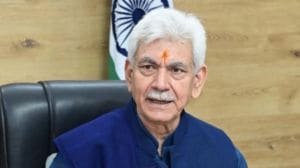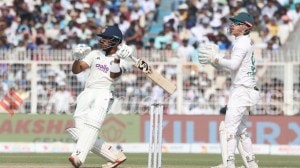Parole denied for Lennon killer Chapman
OCT 4: Mark David Chapman, the killer of former Beatle John Lennon, was denied parole on Tuesday, nearly 20 years after gunning down the m...

OCT 4: Mark David Chapman, the killer of former Beatle John Lennon, was denied parole on Tuesday, nearly 20 years after gunning down the music legend outside of his New Yorkapartment.
"Parole is denied," the three-member panel of the New York State Board of Parole told Chapman in a written statement after a hearing at Attica prison near Rochester, New York, where he is serving a life sentence.
The panel "strongly believes that your release to parole supervision at this time would deprecate the seriousness of the crime and serve to undermine respect for the law," it said.
Chapman shot and killed Lennon on Dec. 8, 1980, outside of the Dakota, the Manhattan apartment building where he lived with his wife Yoko Ono. It was his first parole hearing and he was ordered held for at least two more years until his next hearing, slated for October 2002.
"Your most vicious and violent act was apparently fuelled by your need to be acknowledged," the parole board’s statement to Chapman said. "During your parole hearing, this panel noted your continued interest in maintaining your notoriety."
The board, however, also noted Chapman’s "exemplary disciplinary record" during his incarceration.
The announcement was made uncharacteristically swiftly after the hearing. Normally, such decisions are announced two or three days after an interview with the prisoner.
Elliot Mintz, a spokesman for Lennon’s widow, Yoko Ono, said she "respected the parole board’s decision" and released a lengthy "victim impact" letter she wrote on Sept. 22 to the state authority appealing for Chapman’s continued imprisonment.
Ono wrote that when Lennon was shot by Chapman "for the people of the world, it was as though the light went out for a moment and darkness prevailed."
She said that if Chapman were released, "myself and John’s two sons (Sean and Julian) would not feel safe for the rest of our lives. People who are in positions of high visibility and outspokenness such as John, would also feel unsafe."
Ono added that "it will not be safe for the ‘subject’ himself "if he were released.
Before Tuesday’s hearing Chapman said he was convinced he was no longer a danger to society.
"I could never dream of hurting another person that way now. It’s not going to happen. It’s just not going to happen," he said in published remarks.
In Manhattan, most people interviewed said they agreed with the decision.
"I think it’s great that they denied (Chapman) parole. He has to suffer the consequences," said a fan who described Lennon as a "phenomenal" musical figure whose loss was "already enough."
Chapman told the Rochester Democrat and Chronicle last week how on the day he murdered Lennon he got the musician to autograph one of his albums outside the Dakota apartment building on Manhattan’s fashionable Central Park West.
He said Lennon asked him, "Is that all you want?"
"It was a ruse," said Chapman. "I didn’t want his signature, I wanted his life. And I ended up getting both."
Chapman said he could not pinpoint when he decided to kill Lennon, but said he was obsessed with the Beatles and often took the hallucinatory drug LSD.





- 01
- 02
- 03
- 04
- 05


























